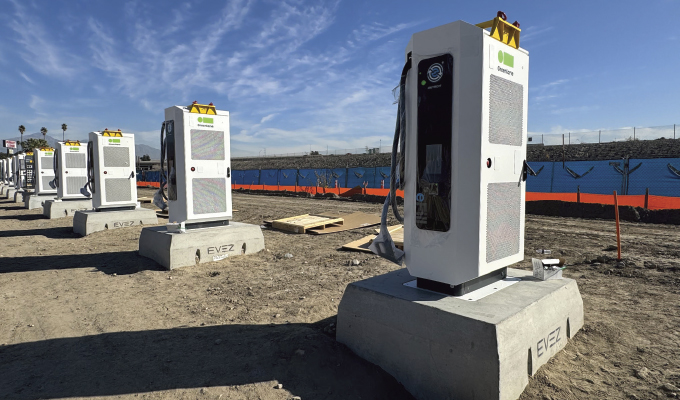With 3.5 million electric vehicles (EVs) on the road in the United States, there is a heightened need for publicly available and accessible charging stations and renewable infrastructure to ensure safe and reliable transportation all over the country. While some states, such as California, are clear leaders in EV adoption and therefore have high demand for public and private charging stations, other states such as Texas and Florida are experiencing heightened demand and have an immediate potential for enhanced EV charging infrastructure. However, installing it can be a lengthy and costly process that involves careful planning and site preparation, as seen by U.S. Department of Transportation’s EV infrastructure project planning checklist. Precast concrete foundations for EV chargers have become an important part of the process, delivering durability and efficiency, alleviating jobsite complexities, and ensuring a seamless and secure foundation for electric mobility.
PRECAST CONCRETE IN EV INFRASTRUCTURE
Traditionally, cast-in-place concrete is used when installing EV charging stations, a process that includes constructing forms, building rebar cages, pouring and finishing concrete, waiting for it to cure, and stripping forms. However, this undertaking not only requires time upfront but also a complete overhaul every time the EV technology improves and charging pedestals need to be replaced or upgraded.
Precon Products, a leader in custom pre-fabricated concrete for construction across various industries, leveraged their six decades of knowledge and expertise to develop EVEZ, a high-quality, patented precast concrete engineered solution to simplify and expedite EV charger installation. By utilizing aluminum plates and eliminating the steps associated with cast-in-place, the installation of EV chargers is simplified into a four-step process: preparing and grading the site, setting the EVEZ base in its permanent location, feeding the cables through pre-made conduit knockouts, and bolting the EV charger on the foundation to secure it in place and safeguard the equipment’s critical assets.
Precon’s EVEZ precast concrete bases offer seamless installation to enable efficient project completion, decreased on-site labor costs, and customizability to meet customer requirements. Recently, Precon provided 50 precast concrete charger bases for Greenlane’s newest charging location in Colton, California, helping to advance zero emission travel on the busy I-15 corridor. All 50 EVEZ bases were installed at the Colton site in a matter of days, cutting down on the weeks-long curing time associated with traditional pour-on-site concrete, supporting efficient completion of the project in only eight months.
Apart from EV charger foundations, precast concrete is an integral part of other construction materials that help speed up installation but also protect the charging units long-term. Precast concrete pads can be used for a range of applications, from battery storage to preservation of components such as transformers or switchgear, while bollards and wheel stops can be used to protect EV charging stations from damage. Durability is an important consideration in this instance; while charging technology might need to be updated and replaced at times, the jobsite should not have to undergo detailed renovations or major excavations.
about the author
Jon Brantingham is with Precon Products’ electric vehicle charging department. For more, visit www.preconproducts.com and www.evez.energy.


